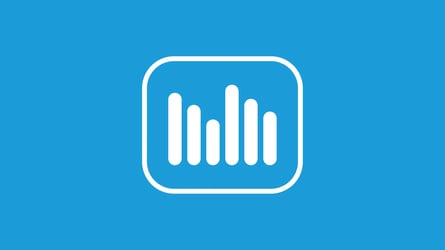When a crisis hits, the last thing you want to do is panic. Simply canceling all your marketing campaigns might seem like a good solution for the short term, but could easily hurt your business in the long run. This might be counterintuitive but try not to respond to the crisis by making business decisions too abruptly. Instead, this is the time to take a step back, and really assess the impact of the crisis on your brand reputation, business operations, customers, and the industry you’re in.
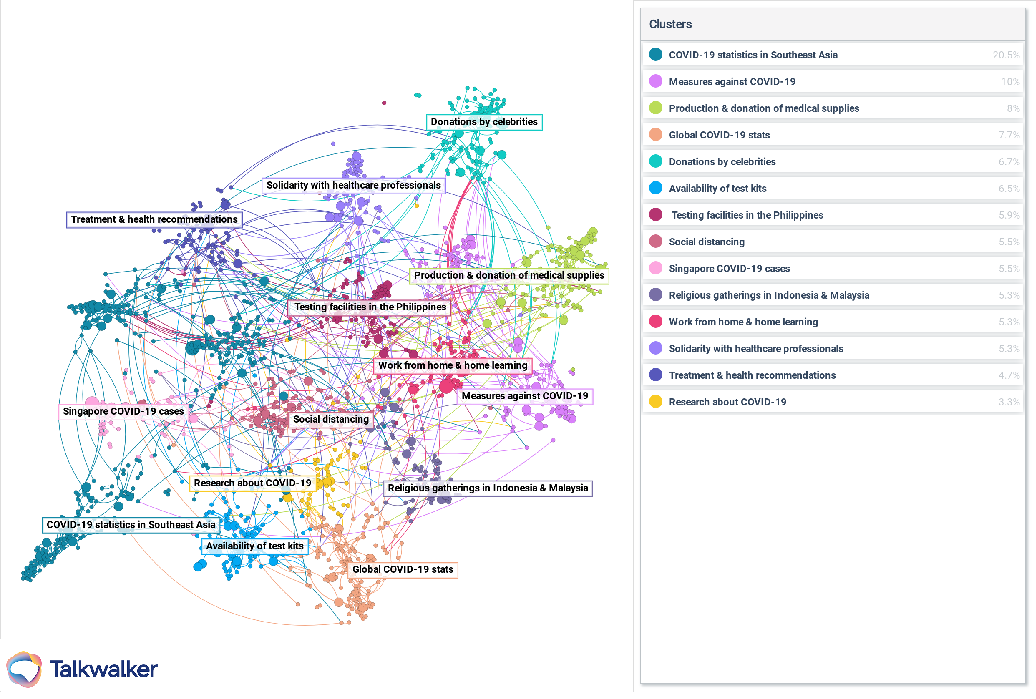
Leading conversations related to Covid-19 in Southeast Asia for the past 30 days
The Covid-19 crisis has impacted all industries in different ways. A recent industry report shows that the consumer goods, e-commerce, telecom, and healthcare industries are facing an increase in demand amidst the crisis.
What about other industries?
How can your brand make a difference in times of crisis?
While there are no magic answers to these questions, these concrete examples of excellent crisis communications from 30+ brands across industries in Southeast Asia will inspire and help your business adapt in these unpredictable times.
Changi Airport and IKEA Singapore adjust their messaging on social media
Before putting out crisis-specific communication or content, evaluate what you already have and adjust accordingly. Do you have an ongoing promotion that’s perhaps supposed to be paused? Or an influencer campaign that might be perceived as tone deaf? For instance, this is not the time to promote traveling, but that doesn’t mean that airlines or tourism companies should simply stop all comms.
Instead, take this time to address concerns your customers might be having. Here’s Changi Airport letting customers know that they are taking the necessary steps to ensure public safety.
IKEA Singapore took this time to release Making Home Count – a short film on YouTube to honor those who are doing their part in staying home.
The film is 100% homemade and seems to be a part of a campaign series by IKEA in Singapore. A great example of how brands can find an opportunity to reshape the message of existing campaigns according to current trends.
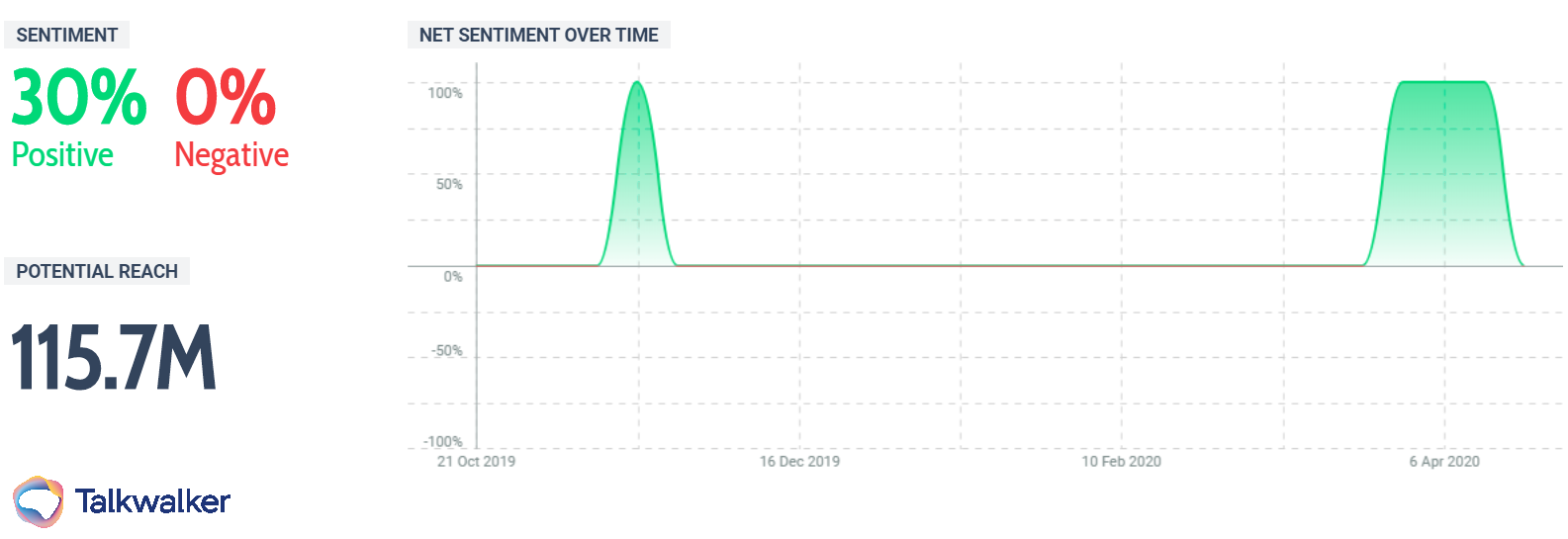
IKEA Make Home Count campaign sentiment and potential reach in the past 6 months
Celcom, M1, Tiger Beer use their logos to promote staying in and #socialdistancing
You might’ve seen brands like Audi, Volkswagen, and McDonald’s using their logos to promote social distancing. Malaysian telco Celcom and Singaporean telco M1 and F&B brand Tiger Beer have done the same – temporarily adapting their logos to make a statement.
Celcom transformed its brand icon from C to a circle and added the #StayIn hashtag to promote safe distancing by staying home.
Similarly, M1 is emphasizing its commitment to help consumers in Singapore stay connected in a time when we must all keep our distance.
While Tiger Beer changed its sunny outdoor view to a house, encouraging consumers to #SupportOurStreets from home until things get better.
Here’s a snapshot of what people are saying:
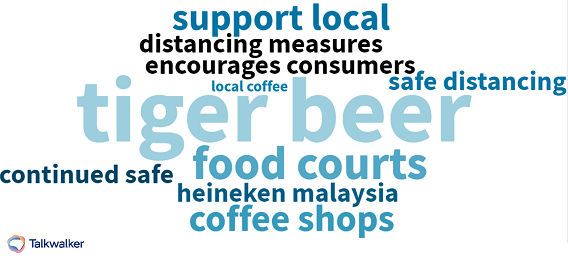
Word cloud related to the #SupportOurStreets hashtag
Southeast Asia telcos give free data and support businesses with WFH
With people staying at home, telecommunications companies are facing an increased demand as more people require constant access to data and information.
To address consumer demand, Singapore’s biggest telcos SingTel is offering businesses free usage of their productivity, collaboration and security tools, and Starhub introduces a free remote working subscription that allows businesses to receive calls for free.
Globe Telecommunications started offering free doctor consultations without any mobile charges and PLDT Smart Communications have enabled free access to official websites to help ensure that consumers are getting their information from accurate sources in the Philippines.
Celcom, Digi, Maxis, and U Mobile in Malaysia are also giving additional data for free, while allowing users to make free calls to the National Crisis Preparedness and Response Centre and other state health department hotlines.
While in Indonesia, Telkomsel has added an option that links customers to a consultation chat service via its app and is waiving data limits for customers visiting official Covid information sites, and Indosat Ooredoo is providing extra bandwidth to accommodate home-based learning and working as part of its #StayHomeStayConnected campaign.

Mentions and engagement related to the #StayHomeStayConnected campaign by "Indosat Ooredoo" in the past 30 days
Likewise, telcos in Thailand and Vietnam are also working on either giving free mobile data or increasing bandwidth capacity during these times, with Vietnam putting a strong emphasis on halting the spread of fake news and misinformation.
Find out more about how Covid-19 is impacting the telco industry in this report
Fast Food brands KFC and Jollibee promote brand experiences with home cooked meals
Instead of seeing a decrease in engagement as people stayed away from public places, fast food chains like KFC Malaysia and Jollibee found ways to re-angle their communications by promoting home cooked meals. Result? Increased product engagement.
KFC Malaysia challenged customers to ‘get creative’ with how they are eating KFC chicken at home with its #KepciKitchen campaign – where food influencers create their own meals using KFC favorites. People can then share their creations and win delivery vouchers.
How did Malaysians feel about the campaign?

Emoji cloud generated from #KepciKitchen query on Quick Search
Jollibee introduced a limited-time only ready-to-cook menu so Filipinos can recreate its famous chicken joy and other Jollibee classics at home. Interestingly, I couldn’t find an official post from Jollibee’s social media pages about this but when the word got out, the company’s official account replied to each post that asked them if this was real. (Great job for the added personal touch!)
Mga kapitbahay!!!!! Ctto pic.twitter.com/vliBmcIJkJ
— The Mart Magdangal (@MartPonsy) March 26, 2020
This virality map shows you how the above tweet from 26 March has gone viral – generating 32.8K likes, 9.4K retweets, 362 comments and counting.
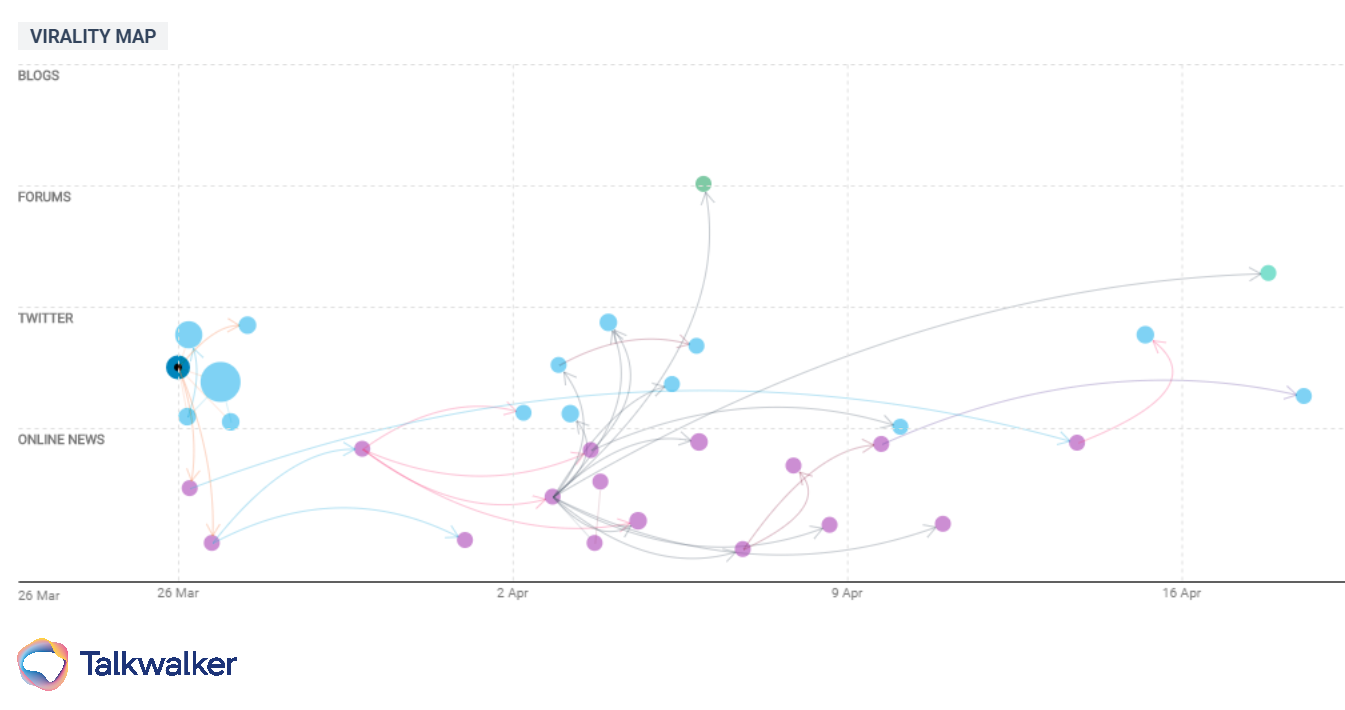
Virality map showing how the tweet above continues to get shared a couple of weeks after posting
Hospitality brands Marina Bay Sands, Marriott International offer support with positive messaging
Most hotels, if not all, have temporarily closed their doors to guests amidst the Covid-19 situation.
With no exception, Marina Bay Sands had dimmed its lights and suspended its famous light shows. Clearly something ain’t right with this iconic symbol of Singapore’s skyline barely visible. A few days into the temporary closure, MBS lit up with 'SG ❤️' in support of the country’s measures against the crisis.
Marriott International also lit up its properties – over 270 hotels across Asia Pacific –with a smiley as part of their “light for hope” initiative to spread positivity.
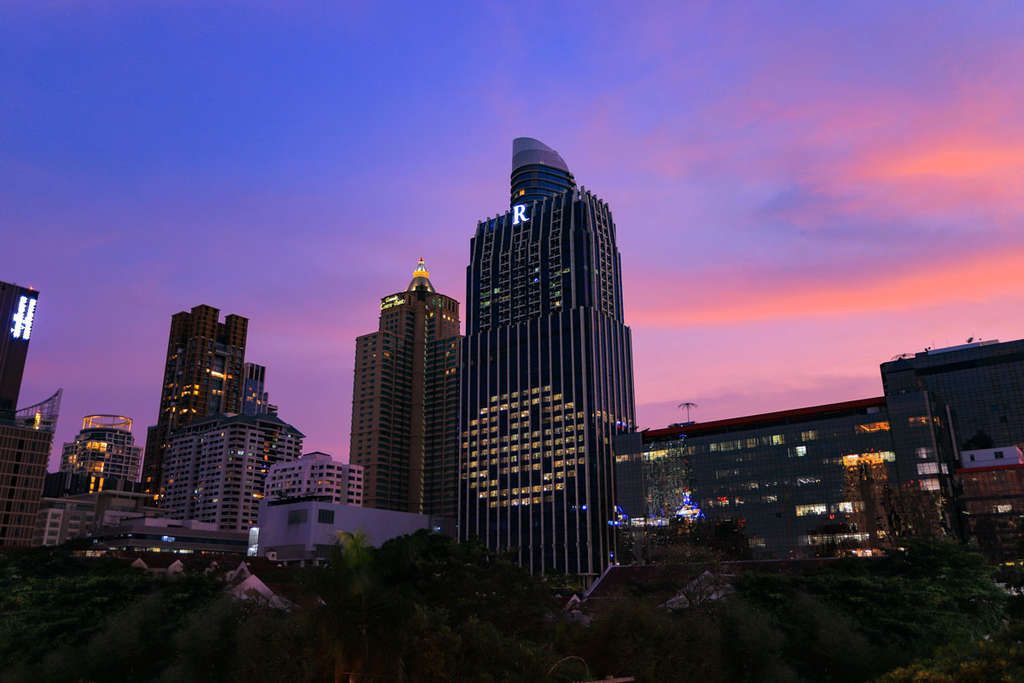
Renaissance hotel in Bangkok
Global brands channel expertise to support production of hand sanitizer and medical supplies
Philippines’ San Miguel Corporation shifted the focus of its alcoholic beverage plant to producing rubbing alcohol to be donated to hospitals and villages across the country. Multinational company Diageo donated ethyl alcohol, a primary ingredient in producing alcohol beverages, to support the production of millions of sanitizers or disinfecting agents in the Philippines, Vietnam, and Myanmar.
Malaysian fashion site Fashion Valet teamed up with Malaysia Official Designers Association (MODA) to source and produce Personal Protective Equipment (PPE), and computer gaming company Razer has set up a face mask manufacturing line to help address the shortage of supplies in Malaysia and Singapore respectively.
This is actual heroism. Wow.
— Ryan Reynolds (@VancityReynolds) April 6, 2020
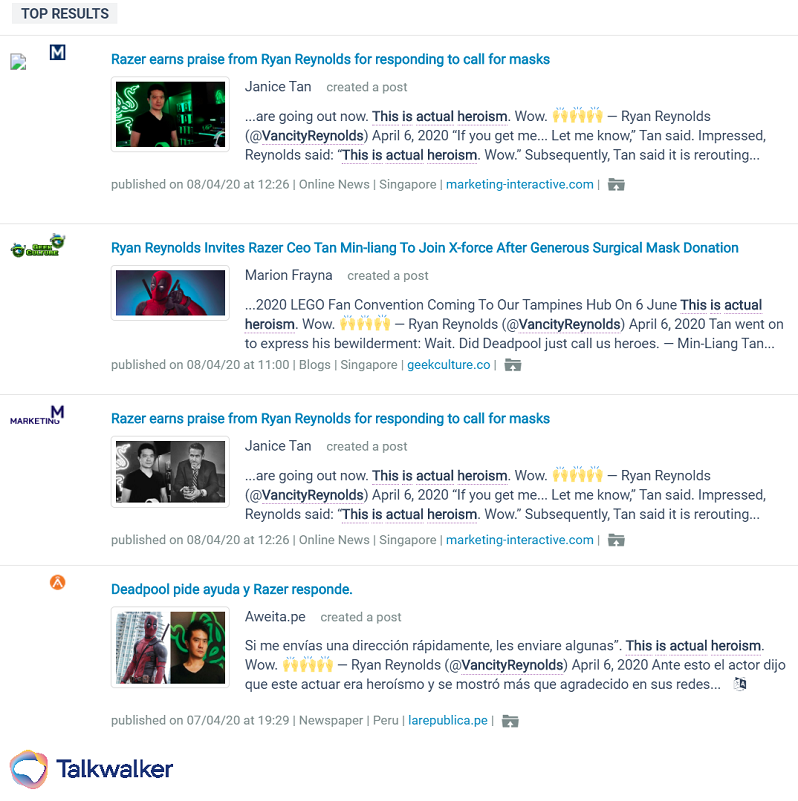
Media/blogs picked up on Ryan Reynolds’ tweet replying to Razer's CEO
E-commerce and delivery platforms bridge the gap between businesses and customers
Following the spike in e-commerce demands, food delivery companies made some adjustments to enable local food & beverage operators during this time. Deliveroo has increased the frequency of payouts, GrabFood introduced a “Local Heroes” icon on its homepage to increase the visibility to single-outlet businesses, and Foodpanda has fast tracked the onboarding process for businesses.
E-commerce platform Lazada (Singapore), on its birthday week, sent a heartfelt email from their CEO. The company shared about how their March IT sale got postponed due to the crisis but despite such downturns, he emphasized the company’s commitment to support the Singaporean businesses and the community.

Online marketplace app Carousell partnered with Unilever Food Solutions on its #SupportLocal campaign, aiming to give added visibility to SMEs and local food businesses through the app’s newly created F&B category. The company also started the #ChooseToGive movement, encouraging users to help those in need by donating items through its platform.
Meanwhile, fashion e-commerce site Zalora has also expanded its offerings to accommodate consumer demand for food, medical, hygiene and household essentials.
TripAdvisor has also launched a campaign in Singapore called #LoveYourLocalSG with a dedicated microsite advocating takeaways and delivery promotions from local partners Burpple, Chope, Shopback GO and Shopee.
Meanwhile, ride-hailing apps Grab and Gojek are using their platforms to educate consumers about Covid-19 symptoms and precautionary measures encouraging the public to stay calm.
Online platforms promote home learning and virtual experiences
With plenty of time to spend online, companies are getting creative in releasing content in the form of virtual experiences to capture audience attention.
Education tech company Snapask pledged to enable free subscriptions to its e-learning mobile app for students based in Singapore.
SEA eSports organization Mineski has started Lockdown Games, an online fundraiser that is streamed on MineskiTV and have attracted support from local gaming associations and brands like Mountain Dew and Enervon Activ.
Shopee and Lazada have also joined forces in supporting the #TogetherAtHome virtual concert hosted by the World Health Organization (WHO) and Global Citizen.

What is your brand’s crisis communication like during this time?
With a crisis at hand, this is definitely a challenging time for most brands regardless of the industry you’re in. However, the situation also provides a great opportunity for your brand to recalibrate your messaging and use your content to develop a deeper connection with your audience.
Before making adjustments to your brand communications, take the time to understand the conversations that are happening around you. Listen to your employees and your customers, and let that guide your response.

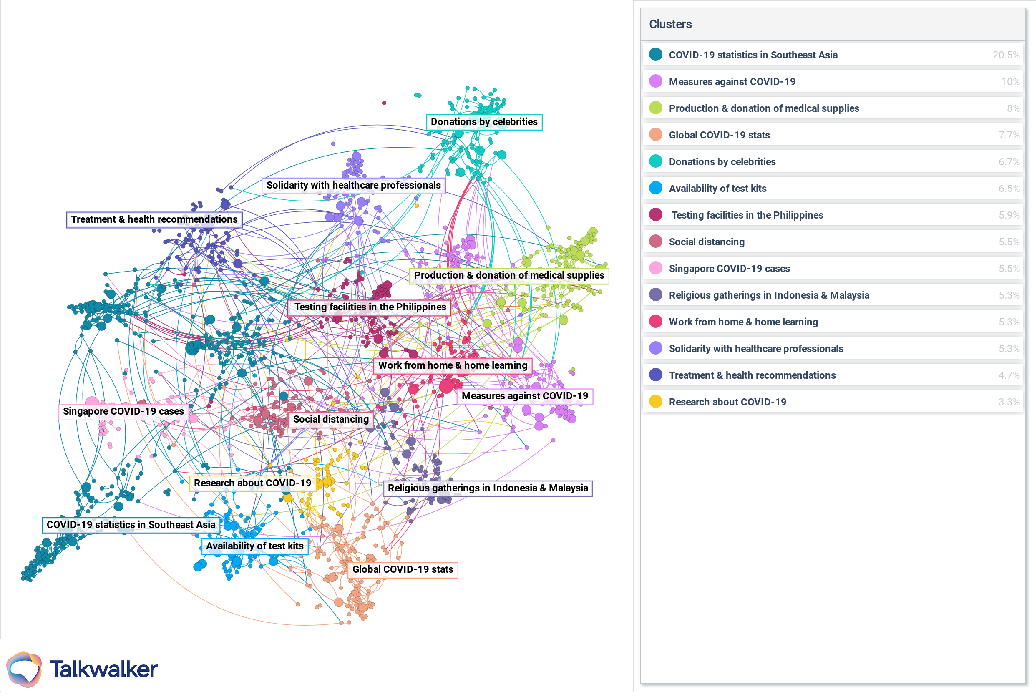
-4.png?width=700&height=200&name=1580-CTA%20(1)-4.png)
